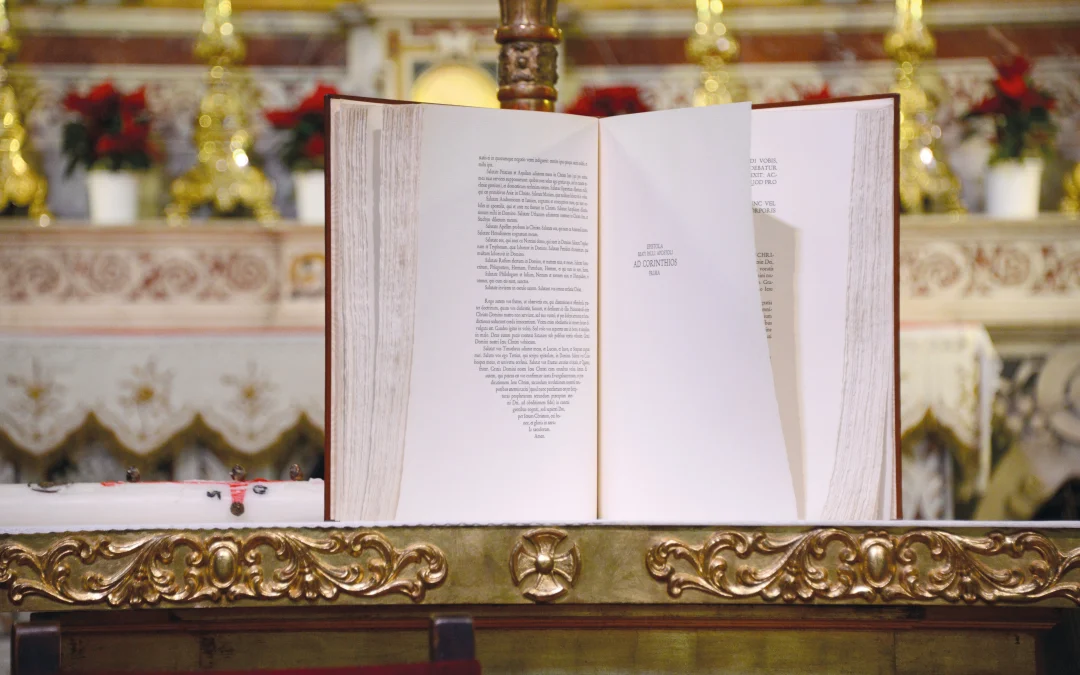Years ago, back when I was a Protestant, I was considering sending my son to a Catholic school. While visiting the school, I chatted with the Director of Religious Education. I wanted him to confirm that the school’s religion curriculum taught from the Bible…and nowhere else.
I was a Sola Scriptura Protestant. I believed that Christians ascertain all the core elements of faith by reading only the Bible. I also believed that any doctrine stemming from any source outside of Scripture was at least unreliable, and, at the extreme, anti-Christian.
While the definition of Sola Scriptura varies between Protestant denominations, at its core, “Sola Scriptura means that Scripture alone is authoritative for the faith and practice of the Christian.”
Sola Scriptura doesn’t allow for any authority from tradition or the Church, particularly any doctrines that aren’t explicitly defined in Scripture.
Let’s first take a look at whether Sola Scriptura is taught in the Bible.
Does Scripture Really Teach Sola Scriptura?
As I mentioned above, Sola Scriptura means that “Scripture alone is authoritative for…faith and practice”. Therefore, for a Sola Scriptura adherent, it only stands to reason that they’d need to glean the belief in Sola Scriptura from Scripture itself.
Usefulness of Scripture
2 Timothy 3:16-17 is one of the most common passages used to justify Sola Scriptura:
“All Scripture is inspired by God and is useful for teaching, for refutation, for correction, and for training in righteousness, so that one who belongs to God may be competent, equipped for every good work.”
First, it’s important to point out that none of the New Testament had been compiled when Paul wrote his letter to Timothy. Therefore, when Paul refers to Scripture, he’s referring only to the Old Testament.
Second, nowhere does he say that only Scripture is inspired by God and useful. Instead, he’s emphasizing the Old Testament’s value. It’s illogical to extrapolate his message to mean Scripture alone.
Trusting the Old Testament
In Acts 17:10-11, we find another reference to the Old Testament that is sometimes used to argue for Sola Scriptura:
“The brothers immediately sent Paul and Silas to Beroea during the night. Upon arrival they went to the synagogue of the Jews. These Jews were more fair-minded than those in Thessalonica, for they received the word with all willingness and examined the Scriptures daily to determine whether these things were so.”
In reality, however, this passage actually points to authority outside of the Bible.
Luke tells us that the Berean Jews examined Scripture, which, again, is the Old Testament, to confirm the oral teachings of Paul and Silas. But he doesn’t say that the Berean’s should discard those oral teachings.
The Bereans believed Paul and Silas spoke with authority. The Bereans merely confirmed the oral teachings agreed with the Old Testament. They believed what Paul preached was, in fact, “the word of God.” (Acts 17:13)
Human Traditions
In Mark 7:8-9, Jesus condemns the Pharisees for disregarding God’s rules in favor of human tradition:
“‘You disregard God’s commandment but cling to human tradition.’ He went on to say, ‘How well you have set aside the commandment of God in order to uphold your tradition!’”
Adherents to Sola Scriptura argue that this passage discredits traditions such as the doctrine that the Catholic Church teaches. However, they do so while taking Jesus’ words out of context…and while misunderstanding Catholic doctrine.
Jesus wasn’t saying that all tradition should be dismissed. Rather, He’s indicating the problem with traditions that contradict God’s commandments. Specifically, in verses 10-13, Jesus explains that the Pharisees’ traditions were causing followers to break the 4th of the 10 Commandments—“Honor thy father and thy mother.”
Catholic tradition, on the other hand, doesn’t break the Commandments. Rather, the Church’s teaching upholds, reinforces, and clarifies the Commandments. The Catechism’s inclusion of an entire section devoted to the Commandments makes this abundantly clear.
This is but a sample of passages that are incorrectly interpreted to support Sola Scriptura. But are there others that directly point to the trustworthiness of traditions outside of the Bible?
Scripture and Tradition
In St. Paul’s letter to the Thessalonians, he makes the answer abundantly clear:
“Therefore, brothers, stand firm and hold fast to the traditions that you were taught, either by an oral statement or by a letter of ours” (2 Thessalonians 2:15).
Paul’s letters comprise nearly half of the New Testament books. Therefore, he’s essentially telling the Thessalonians and, by extension, us, that both oral traditions and New Testament Scripture are authoritative for Christians.
Paul told the Corinthian church something similar:
“I praise you because you remember me in everything and hold fast to the traditions, just as I handed them on to you.” (1 Corinthians 11:2)
Paul didn’t just suggest that they follow the traditions he taught. Rather, he praised them for doing so.
Since he wrote this in his first letter to the Corinthians, he must have passed on traditions orally prior to writing to them…and outside of the letters that we now consider Scripture.
But if the Apostles passed down traditions—outside of Scripture—that we should follow, how can we be certain what they are?
Scripture and the Church
Thankfully, we don’t have to guess what the Apostles taught. And Saint Matthew’s Gospel makes sure that’s abundantly clear.
After Peter confessed that Jesus was the Messiah, the Son of God, Jesus gave us the answer.
“And so I say to you, you are Peter, and upon this rock I will build my church, and the gates of the netherworld shall not prevail against it. I will give you the keys to the kingdom of heaven. Whatever you bind on earth shall be bound in heaven; and whatever you loose on earth shall be loosed in heaven.” (Matthew 16:18-19)
Christ’s Church, the Catholic Church, was built upon Saint Peter, her first pope. And the keys Jesus entrusted to him still extend to the Church today, allowing her to teach us about apostolic tradition and, of course, Scripture.
“The ‘power of the keys’ designates authority to govern the house of God, which is the Church. Jesus, the Good Shepherd, confirmed this mandate after his Resurrection: ‘Feed my sheep.’” (CCC 553)
The Catholic Church continues to feed Jesus’ sheep today by transmitting apostolic tradition and using its teaching authority.
Scriptura
While the Catholic Church—and Scripture itself—may not agree “that Scripture alone is authoritative for the faith and practice of the Christian”, the Church certainly in no way disputes the Bible’s authority.
“Sacred Scripture is the speech of God as it is put down in writing under the breath of the Holy Spirit.” (CCC 81)
I’d contend that, for the Christian, you can’t get much more authoritative than the “speech of God.”
While Protestants sometimes argue that Catholics don’t treasure Scripture like they do, I’d argue that Catholics go a step further. We revere it, we center Mass around it, and we teach it the way the Apostles and their followers did…by following apostolic traditions.
Now that I’m a Catholic, I don’t believe that Sola Scriptura is scriptural or even logical. And it certainly doesn’t allow for the authority that the Catholic Church assigns to tradition.
“It is clear, therefore, that sacred tradition, Sacred Scripture and the teaching authority of the Church, in accord with God’s most wise design, are so linked and joined together that one cannot stand without the others, and that all together and each in its own way under the action of the one Holy Spirit contribute effectively to the salvation of souls.” (Dei Verbum, Chapter 2)
We need to be shepherded as we read Scripture. And we need to understand what the Apostles and their disciples taught.
The only way to do so is through the Church that Jesus built upon Peter…not through Scripture alone.
Photo by Aaron Burden on Unsplash











